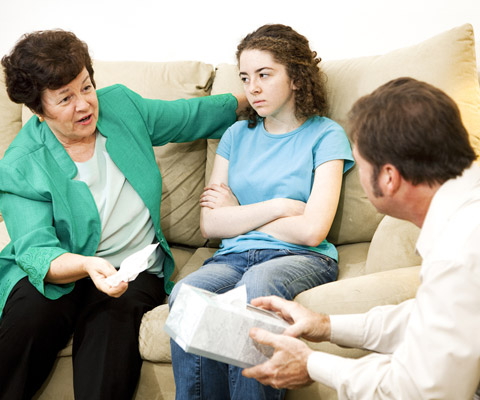Health Communication and Young People: Setting the Scene for Nurses



Young people, parents, and health professionals each enter any health consultation with their own agenda and preconceived ideas. These will have an impact on the communication that subsequently takes place. In this session we describe some of the attitudes, emotions and issues that may affect the consultation and suggest ways by which it is possible to influence these in order to achieve a more positive outcome.
Learning Objectives
By the end of this session you will be able to:
- List some of the attitudes and ideas that young people, parents and health professionals have about communicating with each other
- Consider how your expectations about a consultation will influence effectiveness
- Consider how to create opportunities to meet with young people in independent consultations
- Evaluate when it is important to meet with young people alone
The foundations for any health consultation are set long before the young person enters the health professional's consulting room. Previous consultations, hopes, expectations, and stereotypes all influence the emotions and attitudes of each individual in the room, and eventually the outcome of the meeting. The young person may arrive on their own or with parents and sometimes their friends. However, even when a young person comes to the consultation on their own, the thoughts, feelings and opinions of their parents may influence both the conversation and the required action.
Before commencing this session you should complete the following AH session:
- 04_001 Communication Skills in Young People (401-0018)
Dr Deborah Christie is a Consultant Clinical Psychologist, Honorary Reader and Clinical Lead for Paediatric and Adolescent Psychological Services at University College London Hospitals NHS Foundation Trust. She works with young people searching for ways to live with chronic illness including diabetes, obesity, arthritis, chronic fatigue and chronic pain syndromes. Current research interests include neuropsychological outcomes in children and adolescent survivors of meningitis, quality of life measures in chronic illness and the development of effective multidisciplinary interventions for diabetes and obesity in children and adolescents.


Dick Churchill is a GP in Nottingham and former Associate Clinical Professor at the University of Nottingham. He has both clinical and academic interests in the health of young people and in mental health issues. He is a member of the RCGP Adolescent Health Group and a founder of the Association for Young People’s Health.
- Presentation and Assessment of Children with Speci...
- Posted By eIntegrity Healthcare e-Learning
- Posted Date: 2024-11-11
- Location:Online
- This session provides a developmental approach with which to assess children who are having behaviou...
- Introduction to Special Educational Needs course f...
- Posted By eIntegrity Healthcare e-Learning
- Posted Date: 2024-11-11
- Location:Online
- This session gives an overview of the different types of special educational needs and barriers to l...
- Understanding and Tackling Obesity course for Nurs...
- Posted By eIntegrity Healthcare e-Learning
- Posted Date: 2024-11-11
- Location:Online
- This session covers child eating behaviours and child obesity. Learning objectives By the end ...
- Growth and Nutrition course for Nurses
- Posted By eIntegrity Healthcare e-Learning
- Posted Date: 2024-11-11
- Location:Online
- This session covers assessing normal and abnormal growth, puberty and essential nutrition. This sess...
- Injury Prevention, Safety and Medication in School...
- Posted By eIntegrity Healthcare e-Learning
- Posted Date: 2024-11-11
- Location:Online
- This session will focus on injury prevention and safety in children of school age. It will explore r...







